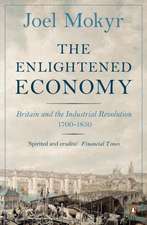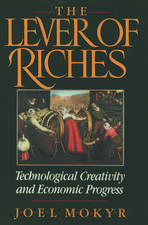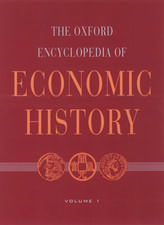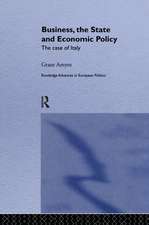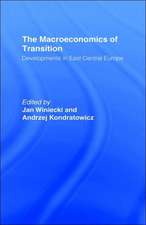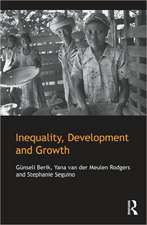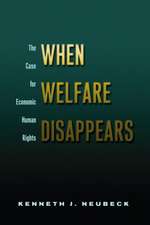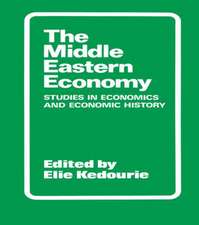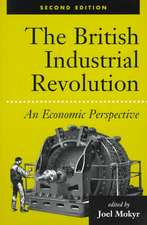Why Ireland Starved: A Quantitative and Analytical History of the Irish Economy, 1800-1850: Economic History
Autor Joel Mokyren Limba Engleză Paperback – 19 oct 2010
Professor Mokyr maintains that the ‘Hungry Forties’ were caused by the overall underdevelopment of the economy during the decades which preceded the famine. In Why Ireland Starved he tests various hypotheses that have been put forward to account for this backwardness. He dismisses widespread arguments that Irish poverty can be explained in terms of over-population, an evil land system or malicious exploitation by the British. Instead, he argues that the causes have to be sought in the low productivity of labor and the insufficient formation of physical capital – results of the peculiar political and social structure of Ireland, continuous conflicts between landlords and tenants, and the rigidity of Irish economic institutions.
Mokyr’s methodology is rigorous and quantitative, in the tradition of the New Economic History. It sets out to test hypotheses about the causal connections between economic and non-economic phenomena. Irish history is often heavily coloured by political convictions: of Dutch-Jewish origin, trained in Israel and working in the United States. Mokyr brings to this controversial field not only wide research experience but also impartiality and scientific objectivity.
The book is primarily aimed at numerate economic historians, historical demographers, economists specializing in agricultural economics and economic development and specialists in Irish and British nineteenth-century history. The text is, nonetheless, free of technical jargon, with the more complex material relegated to appendixes. Mokyr’s line of reasoning is transparent and has been easily accessible and useful to readers without graduate training in economic theory and econometrics since ists first publication in 1983.
| Toate formatele și edițiile | Preț | Express |
|---|---|---|
| Paperback (1) | 417.59 lei 6-8 săpt. | |
| Taylor & Francis – 19 oct 2010 | 417.59 lei 6-8 săpt. | |
| Hardback (1) | 1048.80 lei 6-8 săpt. | |
| Taylor & Francis – 3 noi 2005 | 1048.80 lei 6-8 săpt. |
Din seria Economic History
- 35%
 Preț: 1050.05 lei
Preț: 1050.05 lei - 36%
 Preț: 1043.40 lei
Preț: 1043.40 lei - 34%
 Preț: 1045.74 lei
Preț: 1045.74 lei - 35%
 Preț: 1058.15 lei
Preț: 1058.15 lei - 34%
 Preț: 1045.01 lei
Preț: 1045.01 lei - 35%
 Preț: 1050.42 lei
Preț: 1050.42 lei - 34%
 Preț: 1049.52 lei
Preț: 1049.52 lei - 34%
 Preț: 1186.90 lei
Preț: 1186.90 lei - 25%
 Preț: 359.11 lei
Preț: 359.11 lei - 34%
 Preț: 1045.01 lei
Preț: 1045.01 lei - 34%
 Preț: 1046.82 lei
Preț: 1046.82 lei - 35%
 Preț: 1050.42 lei
Preț: 1050.42 lei - 36%
 Preț: 1046.09 lei
Preț: 1046.09 lei - 36%
 Preț: 1044.12 lei
Preț: 1044.12 lei - 35%
 Preț: 1050.05 lei
Preț: 1050.05 lei - 21%
 Preț: 357.87 lei
Preț: 357.87 lei - 36%
 Preț: 1046.09 lei
Preț: 1046.09 lei - 34%
 Preț: 1044.68 lei
Preț: 1044.68 lei - 38%
 Preț: 766.66 lei
Preț: 766.66 lei - 34%
 Preț: 1044.68 lei
Preț: 1044.68 lei - 35%
 Preț: 1047.35 lei
Preț: 1047.35 lei - 36%
 Preț: 1044.68 lei
Preț: 1044.68 lei - 54%
 Preț: 709.75 lei
Preț: 709.75 lei - 34%
 Preț: 711.55 lei
Preț: 711.55 lei - 34%
 Preț: 1052.22 lei
Preț: 1052.22 lei - 36%
 Preț: 1045.01 lei
Preț: 1045.01 lei - 34%
 Preț: 1044.48 lei
Preț: 1044.48 lei - 34%
 Preț: 1047.90 lei
Preț: 1047.90 lei - 34%
 Preț: 1047.90 lei
Preț: 1047.90 lei - 22%
 Preț: 355.15 lei
Preț: 355.15 lei - 54%
 Preț: 708.69 lei
Preț: 708.69 lei - 36%
 Preț: 1045.74 lei
Preț: 1045.74 lei - 34%
 Preț: 1044.12 lei
Preț: 1044.12 lei - 36%
 Preț: 1047.19 lei
Preț: 1047.19 lei - 35%
 Preț: 1055.64 lei
Preț: 1055.64 lei - 34%
 Preț: 1049.88 lei
Preț: 1049.88 lei - 34%
 Preț: 1045.57 lei
Preț: 1045.57 lei - 34%
 Preț: 1051.86 lei
Preț: 1051.86 lei - 54%
 Preț: 709.75 lei
Preț: 709.75 lei - 54%
 Preț: 714.80 lei
Preț: 714.80 lei - 34%
 Preț: 1045.01 lei
Preț: 1045.01 lei - 34%
 Preț: 712.09 lei
Preț: 712.09 lei - 35%
 Preț: 1049.88 lei
Preț: 1049.88 lei - 36%
 Preț: 1046.82 lei
Preț: 1046.82 lei - 36%
 Preț: 1044.84 lei
Preț: 1044.84 lei - 36%
 Preț: 1043.05 lei
Preț: 1043.05 lei - 34%
 Preț: 1043.76 lei
Preț: 1043.76 lei - 34%
 Preț: 1049.52 lei
Preț: 1049.52 lei - 34%
 Preț: 1049.88 lei
Preț: 1049.88 lei - 34%
 Preț: 1043.95 lei
Preț: 1043.95 lei
Preț: 417.59 lei
Nou
Puncte Express: 626
Preț estimativ în valută:
79.90€ • 83.43$ • 65.98£
79.90€ • 83.43$ • 65.98£
Carte tipărită la comandă
Livrare economică 15-29 aprilie
Preluare comenzi: 021 569.72.76
Specificații
ISBN-13: 9780415607643
ISBN-10: 0415607647
Pagini: 344
Dimensiuni: 156 x 234 x 18 mm
Greutate: 0.49 kg
Ediția:1
Editura: Taylor & Francis
Colecția Routledge
Seria Economic History
Locul publicării:Oxford, United Kingdom
ISBN-10: 0415607647
Pagini: 344
Dimensiuni: 156 x 234 x 18 mm
Greutate: 0.49 kg
Ediția:1
Editura: Taylor & Francis
Colecția Routledge
Seria Economic History
Locul publicării:Oxford, United Kingdom
Cuprins
Acknowledgements 1. Introduction 2. A Poverty-Stricken Economy? 3. The Problem of Population: Was Maithus Right? 4. Land, Leases, and Length of Tenure 5. The Economics of Rural Conflict and Unrest 6. The Problem of Wealth 7. The Human Factor: Entrepreneurship and Labor 8. Emigration and the Prefamine Economy 9. The Great Famine: The Economics of Vulnerability 10. Explaining Irish Poverty Bibliography Index

